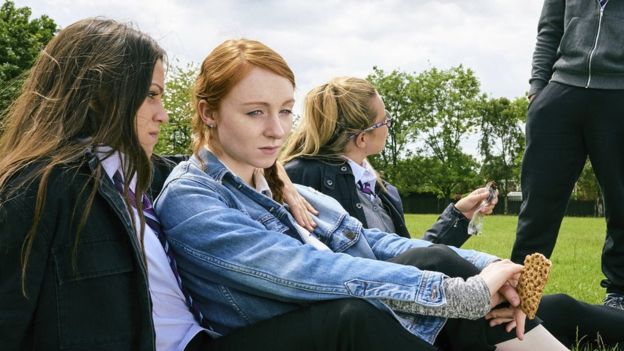First performed as Eva O’Connell’s play two years ago, Overshadowed was released as a TV series on BBC Three earlier this month. Filmed in Leeds through Imogene’s daily vlogging check-ins, Kay Mellor’s piece offers a refreshingly new take on the trauma, confusion and obsession felt whilst developing Anorexia.
The series starts with Imogene (Imo) and her camera, as she sets up her goals for the oncoming weeks. Looming exams, a hatred for her father’s new partner and ‘singledom’ all come together into one solution: getting fit. ‘I just need to take control of my life’, Imo says, looking miserably into the camera lens. An innocent enough claim – but her goals quickly grow more and more disturbing as the series progresses. Imo’s narrative begins as many eating disorders begin: innocently, quietly and with an overlying hatred of her body.
As the title Overshadowed suggests, Imo’s life is judged, belittled and overcast every step of the way – but not just by her online subscribers. A sinister figure watches Imo, shown briefly in dark mirror shots in the first episode, then as a friend who pushes Imo to achieve her ‘health’ goals – until eventually Imo is never left alone. It becomes clear that this fitness crazy friend is in fact a personification of Anorexia.
Anorexia creeps into every part of Imo’s life. She joins in with chats at school, critiques Imo’s reflection and forces her to avoid quality time with her sister, Tara. The figure goes from plaiting her hair after a long day to screaming at Imo to get on the scales – perfectly depicting the emotional confliction of an eating disorder. Although Imo can see how unhealthy and abusive the relationship is, she cannot tear herself away, and is left knowing that Anorexia’s words are irrational, but she is unable to stop them tearing her world apart.
Body image has its place in this series, but refreshingly its presence is not overpowering. Imo is clearly insecure about her looks, joking that she is ‘hashtag thinsporation – not’ and warning subscribers not to look too closely at her sweaty body whilst exercising. But, unlike Netflix’s To The Bone (released back in July), Kay Mellor keeps the emphasis firmly on Imo’s fading identity. We see Imo’s words progressively overlap with Anorexia’s phrases, the aggressive behaviour towards her family and the bitterness towards anybody trying to help. Exhausted by Anorexia’s grasp, Imo muses that ‘some weird routine has taken over my life’, and the focus on her emotional life – rather than the numbers on the scale – reflects this confusion perfectly.
But what is most disturbing about this series is Imo’s warped sense of control. Imo may film herself with her own camera, but we – and her subscribers – are the first to notice the shadow behind her. Doors constantly remain ajar, as if awaiting Anorexia’s arrival, or an interruption from a family member. In an interview with The Radio Times, Kay Mellor comments on this need for control: ‘You don’t know where it will end. You don’t know what monster you’re creating. But ultimately something can be done and Eva [O’Collins] herself is living proof of that’. This series recognizes the appeal of changing yourself, but warns against the emotional turmoil that may follow.
(http://www.radiotimes.com/news/tv/2017-10-01/overshadowed-bbc3-tv-series/).
Imo’s narrative ends before her battle has ended, with Anorexia still looming behind her laptop screen. There is (truthfully) no guarantee of a happy ending, however Imo has recognized the false identity forced onto her by the illness, and ends the series promising to fight without the influence of her camera or subscribers. Overshadowed is an honest view of life under Anorexia’s control, and should be reigned as a heartfelt, personal way of representing eating disorders on camera.
Charlie Collett
Image: BBC

